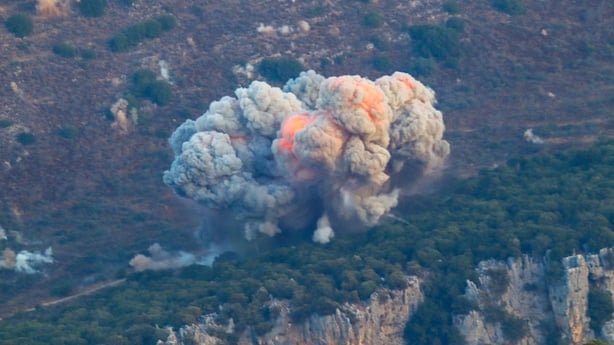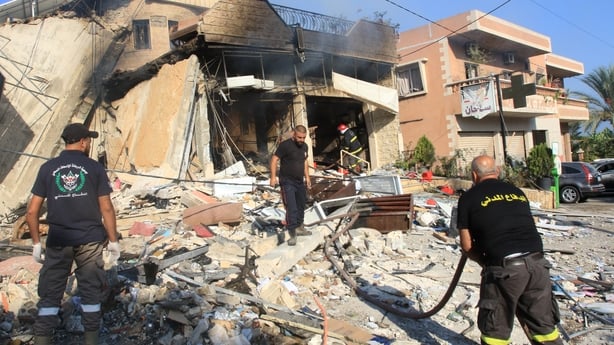Israeli Prime Minister Benjamin Netanyahu has vowed that the military would press on with its aerial bombing campaign against Hezbollah, as Israeli jets attacked the Lebanese group's sites.
"We will continue to hit Hezbollah... the one who has a missile in his living room and a rocket in his home will not have a home," Mr Netanyahu said in a statement after visiting an Israeli intelligence base.
Israel has accused Hezbollah of hiding its weapons in homes and villages in Lebanon, allegations the Lebanese group denies.
Defence Minister Yoav Gallant echoed Mr Netanyahu's remarks in a speech to troops, telling them: "We must continue until we achieve our goal - to ensure the safe return of Israel's northern residents to their homes."
We need your consent to load this rte-player contentWe use rte-player to manage extra content that can set cookies on your device and collect data about your activity. Please review their details and accept them to load the content.Manage Preferences
Mr Gallant contrasted the fight with Hezbollah with that against Gaza's Hamas.
"Hezbollah is not Hamas, there are similarities but also differences," he said.
"The terrain looks different, the enemy looks different, the threats and challenges are different," he said.
He also claimed that Hezbollah had suffered severe blows over the past week.
"Hezbollah today is not the same Hezbollah we knew a week ago," Mr Gallant said.
However, he said that "we have more strikes ready", after Lebanese authorities reported at least 558 people were killed in Israel's attacks yesterday, and thousands displaced.
Longtime foes Hezbollah and Israel have been locked in near-daily exchanges of cross-border fire since Palestinian militants Hamas launched an attack on Israel on 7 October, sparking Israel's war in Gaza.
Hezbollah claimed 18 attacks on Israel, while the Israeli military said the group fired about 300 rockets across the border.

Meanwhile, an Israeli airstrike on Beirut has killed a senior Hezbollah commander as cross-border rocket attacks by both sides increased fears of a full-fledged war in the Middle East.
Israel's military said the airstrike on the Lebanese capital killed Ibrahim Qubaisi, who it said was the commander of Hezbollah's missiles and rocket force. Two security sources in Lebanon described him as a leading figure in the Iran-backed group's rocket division.
The attack dealt another blow to Hezbollah after a series of setbacks at the hands of Israel over the past week, and Israel later said it was carrying out "extensive strikes" on Hezbollah targets.
The Lebanese health ministry said at least six people were killed and 15 wounded in the strike on a building in the Ghobeiry neighbourhood of Beirut.
The Israeli government has made securing the northern border and returning residents there a war priority, setting the stage for a long conflict, while Hezbollah has vowed that it will not back down until a ceasefire is reached in Gaza.
Read more:
The casualty tolls and the intensity of the attacks by the most powerful and advanced military in the Middle East have spread panic in Lebanon, but also defiance among people who recall the devastating Israel-Hezbollah war in 2006.
Calls for diplomacy are growing as the conflict worsens, with UN human rights chief Volker Turk urging all states and actors with influence to avert further escalation in Lebanon.
White House national security adviser Jake Sullivan told MSNBC that he believed "a path forward" could still be found to de-escalation and a diplomatic solution.
Urging restraint, British Prime Minister Keir Starmer called for "all parties to step back from the brink."
The fighting has raised fears that the United States, Israel's close ally, and regional power Iran, which has proxies across the Middle East - Hezbollah, Yemen's Houthis and armed groups in Iraq - will be sucked into a wider war.

Hezbollah last week suffered heavy losses when thousands of pagers and walkie-talkies used by its members exploded in the worst security breach in its history.
The operation was widely attributed to Israel, which has a long history of sophisticated attacks on foreign soil. It has not confirmed or denied responsibility.
Israel's intelligence and technological prowess has given it a strong edge in both Lebanon and Gaza. It has tracked down and assassinated top Hezbollah commanders and Hamas leaders.
But Hezbollah has proved resilient during decades of hostilities with Israel. The group, founded by Iran's Revolutionary Guards in 1982 to counter an Israeli invasion of Lebanon, is considered a more formidable enemy than Hamas.
Hezbollah used a new rocket, Fadi 3, in an attack on an Israeli army base, the group announced in a message posted on Telegram.
Its media office said Israel was dropping leaflets with a "very dangerous" barcode on them onto Lebanon's eastern Bekaa Valley, warning that scanning it by phone would "withdraw all information" from any device.
There was no immediate comment from the Israeli military.
Pan-Arab television station Al-Mayadeen said a journalist working with the station's website, Hadi al-Sayyed, had been killed in an Israeli strike on his hometown yesterday.
It brings the toll of journalists killed in Lebanon since October to four, including two other Al-Mayadeen journalists killed last November and Reuters visuals journalist Issam Abdallah, who was killed by Israeli tank fire last October.

